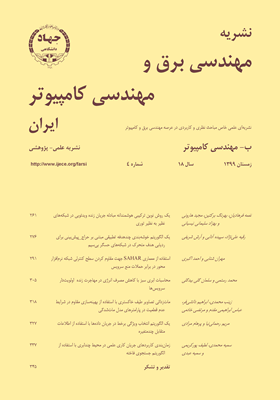استفاده از معماری SAHAR جهت مقاوم کردن سطح کنترلی شبکه نرمافزار محور در برابر حملات منع سرویس
محورهای موضوعی : مهندسی برق و کامپیوتر
1 - دانشگاه علم و صنعت ایران
2 - دانشگاه علم و صنعت ایران
کلید واژه: پروتکل OpenFlow حمله منع سرویسشبکه نرمافزار محور,
چکیده مقاله :
شبکه نرمافزار محور (SDN) نسل بعدی معماری شبکه است که با جداکردن سطح داده و سطح کنترلی، کنترل متمرکزی را با هدف بهبود قابلیت مدیریت و سازگاری شبکه امکانپذیر میسازد. با این حال به دلیل سیاست کنترل متمرکز، این نوع شبکه مستعد از دسترس خارج شدن سطح کنترلی در مقابل حمله منع سرویس است. در حالت واکنشی، افزایش قابل توجه رخدادهای ناشی از ورود جریانهای جدید به شبکه فشار زیادی به سطح کنترلی اعمال میکند. همچنين، وجود رخدادهای مكرر مانند جمعآوری اطلاعات آماری از سراسر شبكه كه باعث تداخل شدید با عملکرد پایه سطح کنترلی میشود، ميتواند به شدت بر کارایی سطح كنترلی اثر بگذارد. برای مقاومت در برابر حمله و جلوگیری از فلجشدن شبکه، در این مقاله معماری جدیدی به نام SAHAR معرفی شده که از یک جعبه کنترلی متشکل از یک کنترلکننده هماهنگکننده، یک کنترلکننده اصلی نصاب قوانین جریان و یک یا چند کنترلکننده فرعی نصاب قوانین جریان (بر حسب نیاز) استفاده میکند. اختصاص وظایف نظارتی و مدیریتی به کنترلکننده هماهنگکننده باعث کاهش بار کنترلکنندههای نصاب قوانین جریان میشود. علاوه بر آن، تقسیم ترافیک ورودی بین کنترلکنندههای نصاب قوانین جریان توسط کنترلکننده هماهنگکننده بار را در سطح کنترلی توزیع میکند. بدین ترتیب، با تخصیص بار ترافیکی ناشی از حمله منع سرویس به یک یا چند کنترلکننده فرعی نصاب قوانین جریان، معماری SAHAR میتواند از مختلشدن عملکرد کنترلکننده اصلی نصاب قوانین جریان جلوگیری کرده و در برابر حملات منع سرویس مقاومت کند. آزمایشهای انجامشده نشان میدهند که SAHAR در مقایسه با راهکارهای موجود، کارایی بهتری در مواجهه با حمله منع سرویس از خود نشان میدهد.
Software-defined network (SDN) is the next generation of network architecture thatby separating the data plane and the control plane enables centralized control with the aim of improving network management and compatibility. However, due to the centralized control policy, this type of network is prone to Inaccessibility of control plane against a denial of service (DoS) attack. In the reactive mode, a significant increase in events due to the entry of new flows into the network puts a lot of pressure on the control plane. Also, the presence of recurring events such as the collection of statistical information from the network, which severely interferes with the basic functionality of the control plane, can greatly affect the efficiency of the control plane. To resist attack and prevent network paralysis, this paper introduces a new architecture called SAHAR, which consists of a control box consisting of a coordinator controller, a primary flow setup controller, and one or more (as needed) secondary flow setup controller(s). Assigning monitoring and managing tasks to the coordinator controller reduces the load of flow setup controllers. In addition, dividing the incoming traffic between the flow setup controllers by the coordinator controller distributes the load at the control plane. Thus, by assigning the traffic load resulting from a denial-of-service attack to one or more secondary flow setup controller(s), the SAHAR architecture can prevent the primary flow setup controller from impairment and resist DoS attacks. Tests show that SAHAR performs better in the face of a DoS attack than existing solutions.
